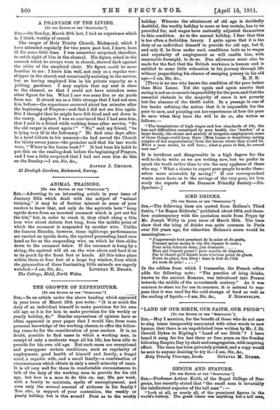THE GROWTH OF EXPENDITURE.
[To THE EDITOR Or THE "Spacrexos.-1 SIR,—In an article under the above heading which appeared in your issue of March 18th you write : " It is as much the duty of an individual himself to make provision for his own old age as it is for him to make provision for his weekly or yearly holiday, &c." Similar expressions of opinion have so often appeared in your paper that I would like, from some personal knowledge of the working classes, to offer the follow- ing remarks for the consideration of your readers. It is, no doubt, possible to find cases in which a working man, in receipt of only a moderate wage all his life, has been able to provide for his own old age. But such cases are exceptional and presuppose certain conditions, such as regularity of employment, good health of himself and family, a frugal mind, a capable wife, and a small family—a combination of circumstances which obtain in only a small minority of cases. It is all very well for those in comfortable circumstances to talk of the duty of the working man to provide for his old age, but how is a man to do this on, say, 20s. per week, with a family to maintain, spells of unemployment, and even only the normal amount of sickness in his family P You cite, in support of your contention, the weekly or yearly holiday, but is this sound? First as to the weekly
holiday. Whereas the attainment of old age is decidedly doubtful, the weekly holiday is more or less certain, has to be provided for, and wages have naturally adjusted themselves to this condition. As to the annual holiday, I fear that this is too often a forbidden luxury. I quite agree that it is the duty of an individual himself to provide for old age, but if, and only if, he lives under such conditions both as to wages and regularity of employment as will enable him, with reasonable foresight, to do so. Due allowance must also be made for the fact that the British workman is human and is entitled to some little relaxation in his journey through life without jeopardising his chance of escaping penury in his old [There is no one who knows the condition of the poor better than Miss Loane. Yet she again and again asserts that saving is not an economic impossibility for the poor, and that the essential obstacle in the majority of cases is not poverty but the absence of the thrift habit. In a passage in one of her books refuting- the notion that it is impossible for the poor to save, and pointing out her experiences of how the poor do save when they have the will to do so, she writes as follows :-
" The temptations of high wages and low standards of life, the loss and difficulties occasioned by poor health, the 'burden' of a large family, the strain and anxiety of irregular employment, none of these things could keep them [Miss Loane is describing saving couples of her acquaintance] from the haven -where they would be. What a man wants, he wilt have ; what is given to hint, he cannot even use."
It is invidious and disagreeable in a high degree for the well-to-do to write as we are writing now, but we prefer to speak the truth rather than to win the easy applause of those who say, " What a shame to expect poor people to make them- selves more miserable by saving!" If our correspondent wants more facts as to the savings of the very poor, let him study the reports of the Dunmow Friendly Society.—ED. Spectator.]




































 Previous page
Previous page